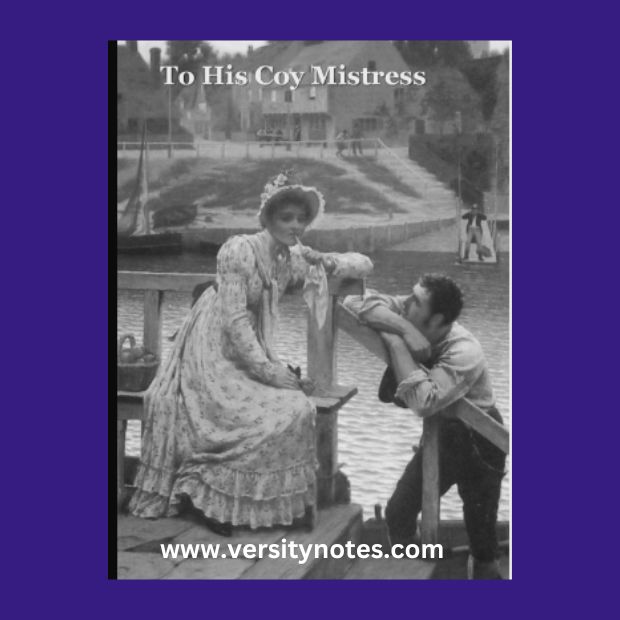To His Coy Mistress Poem Theme
The author tries to convince his beloved to make use of their passion before time runs off. Andrew Marvell’s poem is a notable example of Carpe Diem’s poem which means seize the day. It is demonstrated in each part of the poem in the speaker’s desire to enjoy his beloved. The poem’s speaker emphasizes that life is short, and they should not waste their limited time but rather enjoy it to its fullest.
To His Coy Mistress Summary By Andrew Marvell
“To His Coy Mistress” by Andrew Marvell is a poem written in the form of a dramatic monologue. The character, the author’s speaker, tries to persuade his long-dream sweetheart to become his lover. The poem is structured as an argument for the reality of their whole life ahead. In reality, he suggests that this time will not be enough for them, and relative to the imaginary time continuum, they will be close to each other. The speaker refers to the merciless sweeping of time, he considers that time will continue, and everything comes with it.
Reflecting on the human condition, the speaker emphasizes that their life now will be very brief, and they will lose the opportunity to enjoy it. The speaker does not want to be at such a cost and a big miss. He calls his beloved a beast and suggests they may have no sense of their youth and deceit. The speaker may be suggesting that there may be an afterlife in which they will survive peacefully, but this is not very likely. Hormuzad is convinced that we must live right now because there is a chance that there is nothing else. The author of the poem, Andrew Marvell, refers to such central faculties as wit, and persuasion. The richness of the poem is achieved through the use of these means.
To His Coy Mistress Poem Conclusion
In the poem “To His Coy Mistress,” the author Andrew Marvell skillfully uses logic and emotion to influence his sweetheart. The gradual transition from the world of dreams and reality allows the reader to make sense of it. Using the urgent tone and vivid imagery, Marvell’s call is to hurry up. Indeed, once time has passed, it is no longer possible.
To His Coy Mistress poem Line by Line Analysis
Stanza 1: Dreaming Of a World With More Time
1. Had we but world enough and time, this coyness, lady, were no crime.
If they have time to waste, the shyness or hesitation which is with her is quite acceptable, the speaker seems to be aware of her sloppy conduct, but he looks at it from the perspective of the time factor.
2. We would sit down, and think which way, To walk, and pass our long love’s day.
It is only implied that he paints a picture of the kind of life they were going to live in, a life of leisure that would come after their wedding, free from work and hints at a planned future reunion, meaning that life of leisure and love belongs to them.
3. Thou by the Indian Ganges’ side, Shouldst rubies find; I by the tide
Rather the speaker seems to overemphasize the possibility of being apart; she gets precious rubies by Ganges whereas he lies by the Humber River suggesting the freedom they could enjoy.
4. Of Humber would complain. I would, Love you ten years before the flood,
He tells her that he would have loved her for a long time even before the creation of the great flood meaning he is ready to wait for ages.
5. And you should, if you please, refuse, Till the conversion of the Jews.
The speaker keeps on flexing the imagination when she says that she can turn a blind eye to his signs of affection till the end of time when time is believed to elapse, but he has an eternity of patience.
6. My vegetable love should grow, Vaster than empires and more slow;
He says that it was a tree growing and growing from drop to drop and spreading further and further infinitely like empires themselves, The simile highlights both the power and the duration of love.
7. A hundred years should go to praise, Thine eyes, and on thy forehead gaze;
The man states that he would give a hundred years gazing at her eyes and forehead – the sweet exaggeration of how much time he would pay to each of them to prove how devoted to her he is.
8. Two hundred to adore each breast, But thirty thousand to the rest
Marvell also goes on with the hyperbolic statement, saying he would spend a hundred ages gazing on one breast implying the thought that he could spend an eternity.
9. An age at least to every part, And the last age should show your heart.
He promises to love her throughout his lifetime, love every part of her, and finally, the gift of her heart as proof of his love.
10. For, lady, you deserve this state, Nor would I love at lower rate.
The speaker tries to seduce the lady of his heart, he gives assurance that she deserves to be pampered and he can never give anything below that standard; this puts him closer to her.
Stanza 2: The Reality of Time
But thru my ears, I always hear / That time swings chariot towards me near;”
The speaker explains them as a complete set of ideas with the room metaphorically invaded by the approaching chariot of time – the agent that would ultimately put an end to existence.
12. And yonder all before us lie, Deserts of vast eternity.
He pits their present time against all the time that ever will be before the eternal void and stresses to them how little time any of us, you included, have on this earth.
13. “Thy beauty shall no more be found; / Nor, in thy marble vault, shall sound”
He hints at when she grows old that nobody will care for her, and death is represented by the “marble vault.”
14. My echoing song; then worms shall try, That long-preserved virginity.
A passionately spoken final line shows desperate submission and perhaps revenge against what he once could not accept – worms will get what they want in death.
15. And your quaint honour turn to dust, And into ashes all my lust;
He says to her: “Shame is green, my love; shame is twined like hair; but I will thrust through thee, and through thee yield to none Either extreme in love But both thy shame, and all my passion, lie buried with Thy fat, in secret dead and gone!” The stress is on futility of waiting.
16. The remains of funds are fine and personal / Having to exist in such a location, none of them get intimate.
The speaker uses irony here and tells her to cut away from that grave because it seems to be private but the place for love is not there.
Stanza 3: Urging to Seize the Moment
17.The grave’s a fine and private place, But none, I think, do there embrace. Now therefore, while the youthful hue
Sits on thy skin like morning dew.
He moves to the present and writes that since she is young like a dew on the grave&page2 he means they should take advantage of that.
18. And while thy willing soul transpires, At every pore with instant fires,
The speaker emphasizes her readiness and her passion and meanwhile uses a flame image, telling her that she needs to take action while she is burning.
19. Now let us sport us while we may, And now, like amorous birds of prey,
He encourages them to act on it at once, reminding of how sharp they are, describing the eagles as birds of prey.
20. Rather at once our time devour / Than languish in his slow chapped power.They recommend the speaker should eat time with preference rather than be consumed slowly by time, underlining the importance of taking opportunities.
21. “Let us roll all our strength and all / Our sweetness up into one ball,
He suggests that they fold all their heat and flame into one second only – which expresses unity and action.
22. And tear our pleasures with rough strife / Through the iron gates of life:
There are strong descriptions of life expectations; the speaker tells their passion as a message to escape through barriers, thus revealing their desire to live.
23. “So though the Lord will not let us stop the sun / We will nevertheless make the sun move backward.
In the last four lines he concludes that they cannot freeze time, but they can speed it up, and make it go faster by enjoying each second.
The poem was written by Andrew Marvell, who is the original owner of the poem and get the full poem learn more


1 thought on “To His Coy Mistress poem full explanation by Andrew Marvell”